The Alan Durban story: From Brian Clough to Sir Stanley Matthews to Pele and James Bond
- Published
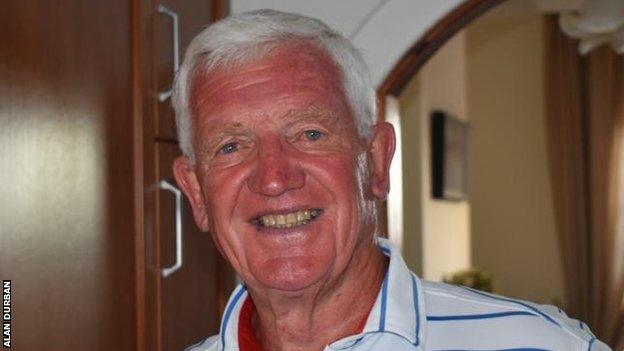
Alan Durban still lives in Telford having moved there after leaving Cardiff City in 1986
From a title under Brian Clough to a tussle with Sir Stanley Matthews, and from a Wales debut at the Maracana to signing two winners of the European golden boot.
Alan Durban enjoyed a memorable football career.
He is a decent tennis player, too, who once played doubles with Pele and Sir Sean Connery.
"They were both hopeless," Durban tells BBC Sport Wales. "But we had a drink afterwards. It was a good day."
The unlikely match took place during a holiday in Marbella in the summer of 1982, when Durban was offered a game and only realised when he stepped on to the court he would be playing with the world's best footballer and the James Bond of the day.
At the time, Durban was manager of then top-flight club Sunderland.
Born in Porthcawl and raised in Margam, Durban grew up a Swansea fan but was spotted by Cardiff City.
Durban, 78, says he was only picked to make his debut in 1959 because half Cardiff's team had blisters caused by new boots at the start of a new season, but he soon found his feet in the side.
He made more than 50 Cardiff league appearances, including one against a Stoke team featuring former England winger Matthews, who was approaching 50 years old.
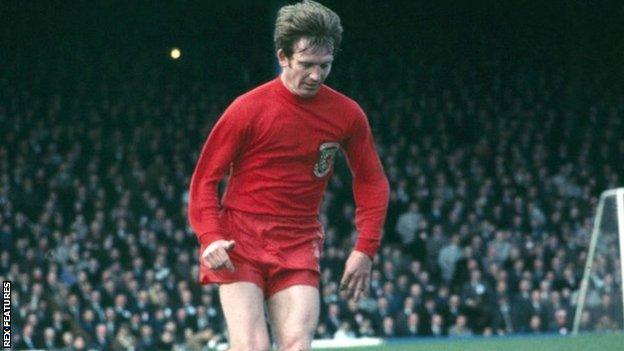
Alan Durban scored six times in 27 appearances for Wales
"He went past me time after time," Durban recalls.
It was thanks to another legend of the game, John Charles, that Durban left Cardiff for Derby County in 1963.
"John wanted to come back to Wales from Roma and Cardiff needed money to bring him in. I was one of three players they sold to make way," Durban says.
He had been on Glamorgan's books while at Cardiff, but he hung up his cricket spikes on the advice of Bluebirds team-mate - and another of Wales' finest footballers - Ivor Allchurch.
"I loved Ivor," Durban adds. "His knowledge of the game and the way he played - he was never hurried.
"He would amble out to warm up and then hit the ball into the top corner from outside the box. I learned so much from him."
Derby were in Division Two when Durban arrived at the Baseball Ground, but a glorious spell was ahead.
After a 32-year-old Brian Clough was appointed Rams manager in 1967, many players left but Durban was kept on.
An inside forward, he was used more in midfield by Clough as Derby won promotion to the First Division in 1969.
Three years later, Derby were league champions for the first time in their history.
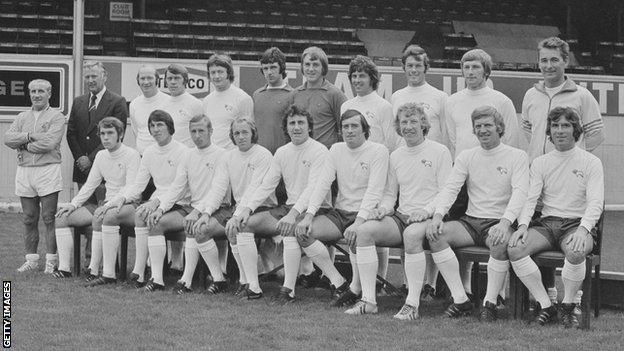
Alan Durban (front row, second from right) pictured with the Derby squad as well as manager Brian Clough (back row, right) in 1973
"Cloughy's motivational skills were incredible in terms of keeping you on your toes," Durban says. "I played about 300 games for him and I never felt like a regular.
"He didn't coach - that was (assistant) Peter Taylor. What he had was principles. He laid down what we should do."
Dave Mackay, a double winner with Tottenham in 1961, left Derby the year before the title triumph, but Durban feels the Scot played his part.
"He was the best I ever played with or against," he says. "When he left, his standards and attitude stayed with us.
"He was almost as important as Clough and Taylor."
Derby reached the European Cup semi-finals in 1972-73, with Durban playing in the 3-1 loss at Juventus which famously prompted Clough to accuse the hosts of cheating.
Defeat was particularly painful for Durban given that the end of his time at Derby was near.
He won all 27 of his Wales caps while at Derby, the first coming in a friendly in Brazil just before the 1966 World Cup.
"Pele didn't play because he got injured the day before," Durban says.
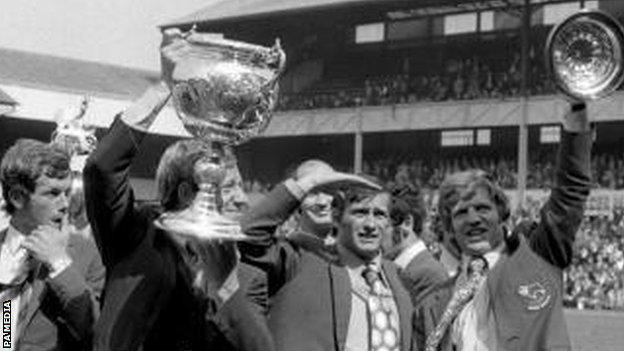
Alan Durban (right) celebrates Derby's 1973 title triumph with team-mates
The end of Durban's international career coincided with his Derby exit, as he joined Shrewsbury Town as player-assistant manager in 1973.
"I went to the very first PFA (Professional Footballers' Association) management course - (Terry) Venables, (Sir Bobby) Charlton, (Alex) Stepney, Ian St John were there," Durban says.
"I got an opportunity to go to Shrewsbury and within a couple of months the manager, Maurice Evans, was ill and they asked me to take over."
Durban was unable to save Shrewsbury from relegation in 1974, but he led them back to Division Three 12 months later.
He left in 1978 for Stoke City, and steered them to the First Division in 1979.
It was while at Stoke - and amid criticism over a performance at Arsenal - that Durban suggested "clowns" might be the answer "if you want entertainment", a line which was not quickly forgotten.
"Everybody picked up on one sentence," Durban says.
"What I was trying to say was that it was not my job to entertain the Arsenal crowd.
"My job was to send the Stoke supporters home with a bit of pride, and I was at Stoke - and the same at Sunderland - when we had to fight to survive."
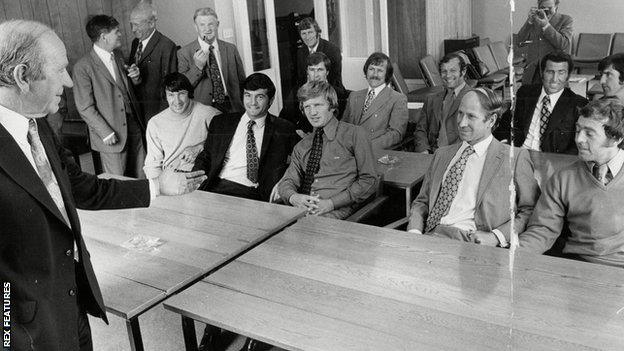
Alan Durban (centre) listens to Sir Matt Busby alongside other prospective managers on a PFA course in 1973
The move to Sunderland came in 1981, thanks in part to the Wearside club's pledge to buy the house Durban owned in Shrewsbury for the same price he had paid for it.
"Some of the houses in the area had started to subside and one or two people couldn't get mortgages," Durban says.
"There was a chance my house would lose quite a lot of value. That was a big thing because the money in the game was nothing like it is now."
Durban spent much of his time at Sunderland trying to reshape a bloated squad, with a young Ally McCoist among his signings.
"He was at St Johnstone and working in a tax office," he says.
"He struggled a bit at Sunderland, but he was a super lad and a good player. Then of course he won the European golden boot (at Rangers)."
Sixteen years after landing McCoist, Durban - by then chief scout - had a big hand in bringing another promising forward to Sunderland, as Kevin Phillips arrived from Watford.
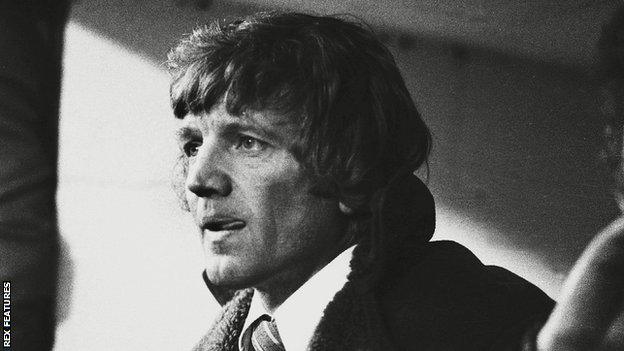
Then Stoke City boss Alan Durban watches on from the dugout during at Crystal Palace in 1979
"I said to Reidy (then manager Peter Reid), if we can get him for £500,000, we will get our money back," Durban remembers.
"We got him for about £300,000. I might be the only person who signed two players who went on to win the golden boot."
Durban's managerial career ended in 1986 after back-to-back relegations with Cardiff.
When he took the job in 1984, Durban had been keen to return home to be close to his mother after the death of his dad, but says he "never had a chance" because of a limited squad at Ninian Park.
After leaving Cardiff, he spent a decade managing the national tennis centre in Telford and scouted for the likes of Fulham, Norwich and Coventry as well as Sunderland.
Durban worked alongside Roy McFarland at Derby in the mid-1990s, and was a mentor to Stoke City's young players until retiring aged 75.
Even as his ninth decade approaches, the coronavirus pandemic notwithstanding, he remains a regular on the tennis court.
"Sport has always come naturally to me," Durban says. "I can't move so well now, but I can still hit the ball."